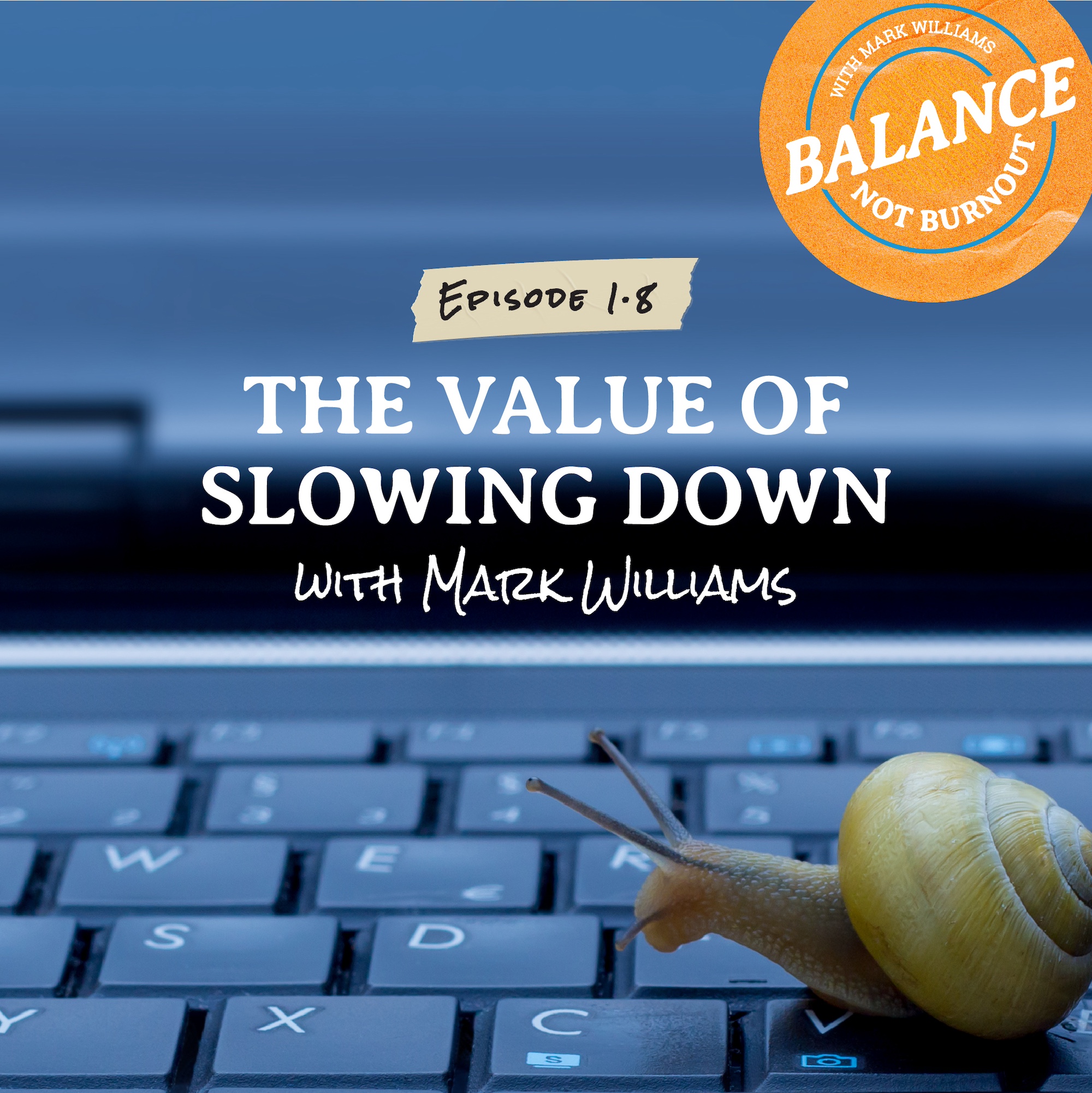
About the Episode
Join me as I explore the benefits of slowing down. We will explore how slowing your pace can lead to a more well-balanced life. We will dive into how multi-tasking can hurt your quality of work and why taking a new approach can make you more productive. This episode serves as a guide for listeners seeking to cultivate meaningful connections, savor the present moment and rediscover the joy in everyday life. As we delve into the tangible benefits of intentional living, you’ll gain valuable insights into how slowing down can lead to increased focus, creativity, and overall life satisfaction.
This is the season finale of Balance, Not Burnout. Huge thank you to everyone who has listened and stay tuned for Season 2 coming in February 2024!
–
Episode Transcript
- Mark Williams:
You’re listening to Balance, Not Burnout, a podcast helping leaders rethink the speed of their business. And I’m your host Mark Williams. Join me as I explore the power of a more intentional, balanced approach to leadership. Thanks for listening.
Welcome to Balance, Not Burnout. This is Mark Williams. And I am super excited to announce that today is episode eight, our final episode of the year. And I can’t thank all my listeners enough for joining in and listening to all of the great guests that I’ve had. Today, I wanted to talk a little bit about the goal of slowing down right balance, not burnout.
And I wrote an interesting article literally just a few days ago about the reasons why slowing down at work is a good idea. So not only has it been beneficial for me, just to slow down, take a breather every once in a while, like we’ve talked about on several podcasts, but I think it’s good for your employees. And so I wanted to share a couple of reasons why I think slowing down at work is a really great idea. And actually, all of these things I’m about to mention I have experienced firsthand. So the first one I will tell you is I think you need more time just to think oftentimes, when we’re rushed, we’re doing things literally off the top of our head and not taking the time to think things through. I know that’s true for me. And in the past. Oftentimes I have said to myself, if I just had a little more time, or if I had slowed down, I could have done this a little bit better.
So the first benefit for me slowing down, outside of just not burning out again, the title of our podcast is I think it does result in more time to think and better decision making. But I’ll also tell you, I think your rational brain kicks in. I think oftentimes we’re more confident in our ideas and our decisions when we make the mindfully. Oftentimes a fast decision is a decision from the gut. And they always tell you go with your gut.
However, I will share it there have been times I needed to do a little bit more research, or take a little bit more time just to weigh the pros and cons of either a decision I’m about to make a purchase I’m about to make, how many times have we bought something and then realized now maybe I shouldn’t have bought it or after a few days, you have buyer’s remorse, had we slowed down just a little bit, oftentimes, those decisions would be different than we made. So I think sometimes your rational brain kicks in when we slow down a little bit. I’ll also share I am a much better listener. When I’m slowing down.
I used an example in one of my walking with Mark videos recently, I used to do the crossword puzzle heavily. And I often found that I would work on the crossword for 25 or 30 minutes, I would set it down. And I would come back to it a few hours later, literally take a break from it and come back. And I would get more answers than I had before. They also tell you when you take a test, you should slow down, read the question, oftentimes reread the question. And even when you’re finished, go back and reread some of those questions. Again, I have found that that 100% Works for me.
But I’ll also tell you that my listening skills improve. If I’m constantly actively listening and paying attention to myself listening, believe it or not, I think I comprehend much more than when we’re just having a really brief fast conversation. I think multitasking often leads to just that we’re doing so many things, that oftentimes the quality of our output isn’t quite as good as if we had slowed down, taking a break, applied, maybe some some better listening or better thinking or better diagnostics to an idea, and then picking it back up. So I do think listening, our listening skills really do improve.
So I’m going to ask you, you never know when this might help. And you when you find a missing piece to a personal puzzle or gain more respect and traction among your co workers, when you’re taking the time to listen to them. fewer mistakes. I know for me when I slow down, and I’ll give you some some live examples. I’m a car guy and I do a lot of work.
I have a 64 GTO convertible that I do quite a bit of work on not only mechanical work, but every once in a while I’ll take a piece of the chrome off and re chrome it things like that. And I have found that when I take my time, oftentimes that work is tedious. Trying to read chrome pinstripes, for example, or very small metal pieces is very difficult and time consuming. If I don’t slow down, I’m going to make a mistake. Well, I have found that work. The same rule applies.
If I’m creating a budget for next year, for example, right now I’m in the throes of budget time. I need to slow down and make sure I’m gathering all the facts. I don’t want to make a mistake and possibly undercut a budget or over budget in a certain area. So The decisions that I make need to be decisions that will last a long time. And so slowing down and taking a break has benefited me greatly, specifically with making decisions. But also tell you, your brain, and I literally just just read this, your brain will remember how to act. This kind of practice is also great, because it will eventually train your brain to slow down and work this way automatically.
I didn’t know that actually, it’s something that I learned. And I did a little bit of research on it. And your brain is like a muscle. So the more you exercise it in whatever you’re doing, it’s going to learn that. So if you slow down and are mindful of the things you’re doing, your brain is going to react, I literally just read a book called mindful to mindfulness, excellent book about slowing down. And one of the examples they used was literally, when you’re eating a meal, think about the last time you ate. And if you actually tasted all the flavors on your plate. And so what the book recommended is to sit down one on purpose, slow down, and literally attempt to taste every flavor in your meal.
It’s an interesting test. So I’ll, I’ll give, I’ll submit that to you. And I’ll ask you to give that a try. The other thing is through music, we’re a big music family, we have music on all the time, my son as a musician, plays drums and has for years. It’s interesting, when you sit and listen intently to music, you will listen you will hear much more of the sounds and the instruments in the in the song that you’re listening to, regardless of what it is, if you slow down and really try to listen to the music.
So I’ll offer that up as well. I also believe that slowing down eliminates unnecessary work, I can tell you that I think busy work is a real thing. I have employees that oftentimes they look busy or they’re doing something but they’re not accomplishing a lot. As managers, I think it’s really important for us not only to talk about what that is, but actually challenge our employees. There’s lots of work that make that we do that makes us feel busy, but at the end of the day isn’t quite as productive as we need them to be. So I’ll challenge you on eliminating unnecessary work.
We had a guest on Chris Leone a few episodes ago, and he has reduced his workweek down to four days. Interesting balance, not burnout, right four day workweek. So you’re getting a three day weekend, almost every weekend. And yet on Friday, they are doing a little bit of work. But what he has found is that they’re eliminating unnecessary work. It’s a mindset of efficiency. I found that interesting.
So I’ll admit, in many places that I have worked, we have a meeting, before the meeting, and then a meeting before that meeting. And it seems like we’re always getting ready for another meeting. He has made it a point to try to sidestep that he uses agendas in every meeting as an example. Right. So he’s cutting out the unnecessary chat, the unnecessary work that isn’t there. And he has found that the company is much more efficient. So again, I’ll challenge you to eliminate unnecessary work or the busy work that we think we’re doing that’s making a difference that really isn’t.
Finally, I think you’ll learn to let go of stress. And if nothing else, this podcast is talking about not burning out, we have all lit the candle at both ends at some points in our life. And then we look back and say wow, if I had just slowed down, if I just taken a break, maybe this the outcome would have been different. Instead of chewing your nails down to the down to the quick and tapping your feet annoyingly, while waiting for co workers to finish off their tasks, concentrate on the work on your desk.
Do it right rather than doing it fast. Learn to let go of the things that are making a stressful and I have recently literally just this week made it a point to put down my phone. I oftentimes have found myself checking email needlessly six, eight times an hour. I’m creating stress that I don’t need to. I remember working when we didn’t have cell phones that if you want to get in touch with some

